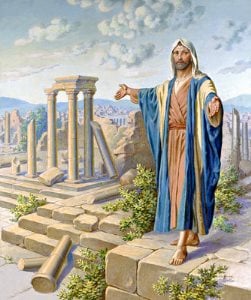Monday: God’s Greatest Promise
Read Haggai 1:12-14.
Notice the sense of unity of purpose here. Why was that so important in order for them to do that which they were called to do?
This time the message instantly is obeyed by the leaders and the remnant people. They make preparations, gather materials, and resume work on the temple three weeks later. Within another week they erect an altar and restore the sacrificial worship (Ezra 3:1-6). In less than five years the temple is completed.
While the kingdom of God cannot be identified with a material building, the book of Haggai is a reminder that God sometimes uses material things, such as buildings, for spiritual ends.
If immediate compliance with the prophetic message is considered to be the measure of a prophet’s success, then Haggai stands out as one of the most successful prophets. His preaching moved the people to action. Within the month, work on the temple resumed with God’s prophets assuring the people that the Lord would help them.
Haggai 1:12-14 reports the response of the leaders and the people to Haggai’s message. All obeyed the Lord because they recognized that he had sent Haggai. They “feared the Lord” (vs.12, NIV), and showed this by worshiping Him and giving Him due attention. So Haggai now could deliver a new word from the Lord: “‘I am with you’” (vs.13). As soon as the people decided to obey the Lord, the messages of reproof were replaced by words of encouragement. The assurance of God’s presence gave them the promise of all other blessings. The statement “‘I am with you’” goes back to the covenantal promises that God made during the time of the patriarchs and Moses (Gen. 26:3, Exod. 3:12, Num. 14:9).
Of course, the greatest manifestation of God being “with us” is Jesus (see Isa. 7:14, Matt. 1:23, 28:20). Dwell on the whole idea that Jesus, the Creator and Sustainer of the universe, lived among us. What does that tell us about our importance in a universe that is so big that we easily can see ourselves as insignificant nothings? Bring your answer to class on Sabbath.


The idea of creator to human is beyond my comprehension. That might be why it does not inspire me to awe as the lesson’s question seems to require. I think that creation is beyond words but it was created from spoken word. The spoken word does not take up space so it seems fairly easy to me that the Creator should become a man. However, I cannot relate to how that might confine Him, (b/c I’ve never been w/o body.) Did The Word loose any of His power when He became human? It is my understanding that He did not. What does inspire me is that all of that power which is Christ would humble and subject Himself to the cross for me. I struggle so much with a stubborn heart, still, that I often wonder if I’m even saved or just playing religion. Such humility would require awesome depths of . . . love? I guess that is why He sweated blood.
Thank You, Lord, that it was You who took on this responsibility. Please forgive my pride and remove my stubborn, stony heart and give me one of flesh. You do not think of my worth, You think of how much you love Your creation. Help me to love and not judge.